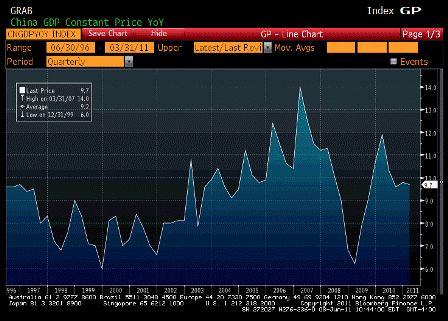This is year over year ‘real’ GDP growth.
Note the recurring first quarter spikes followed by dips, presumably due to front loading annual state spending and lending.
Not much of a spike this year, due to cutbacks in state spending/lending, but the reduced spending/lending that resulted in the reported growth was likewise front loaded for 2011.
Question now is what the traditional second half dip will look like.
Seems to me it could get pretty ugly.
Also, Japan’s earthquake looks to have weakened world growth more than originally expected. And it’s all probably path dependent, meaning growth simply resumes from the lower, post quake base, especially in light of their reluctance to increase their deficit spending.
Europe is also weakening due to self imposed austerity.
And the US is heck bent on doing same as both parties agree on the need for multi trillions of deficit reduction, while Fed policies continue to work to reduce govt. interest payments to the economy and continue to shift income from savers to bank net interest margins.
H2 is still looking hopeless to me, and also looking like we’re flying without a net.


